HoneyBook alternatives offer diverse features for businesses seeking efficient client management solutions. In 2026, top alternatives include Bonsai, Dubsado, and Simply.Coach, each providing unique tools for invoicing, CRM, and project management. Bonsai excels with its intuitive interface and comprehensive features, while Dubsado offers robust automation capabilities. Simply.Coach stands out with its coaching-focused tools, ideal for service providers. Choosing the right platform depends on specific business needs, such as budget, user interface preferences, and required functionalities. Evaluate free trials to determine the best fit for enhancing productivity and client satisfaction.
Being organized throughout the process of working with clients is essential for the success of a business owner. If you are running your own business, you will have to spend a significant amount of time tracking administrative tasks such as drafting contract templates, preparing scope of work templates, keeping clients satisfied, and ensuring timely payments.
An online, all-in-one business management platform can make that work a lot easier while keeping you organized and ensuring you look professional.
One popular platform is HoneyBook. It is integrated with essential tools such as invoicing, contracts, and a project management platform. HoneyBook streamlines the client booking process, from inquiry to project completion, saving time and ensuring organization.
HoneyBook is one good option, but it may not be the best for your business. There are HoneyBook alternatives on the market that can help you grow, that are more intuitive and that provide better features at a better price.
#1. Bonsai
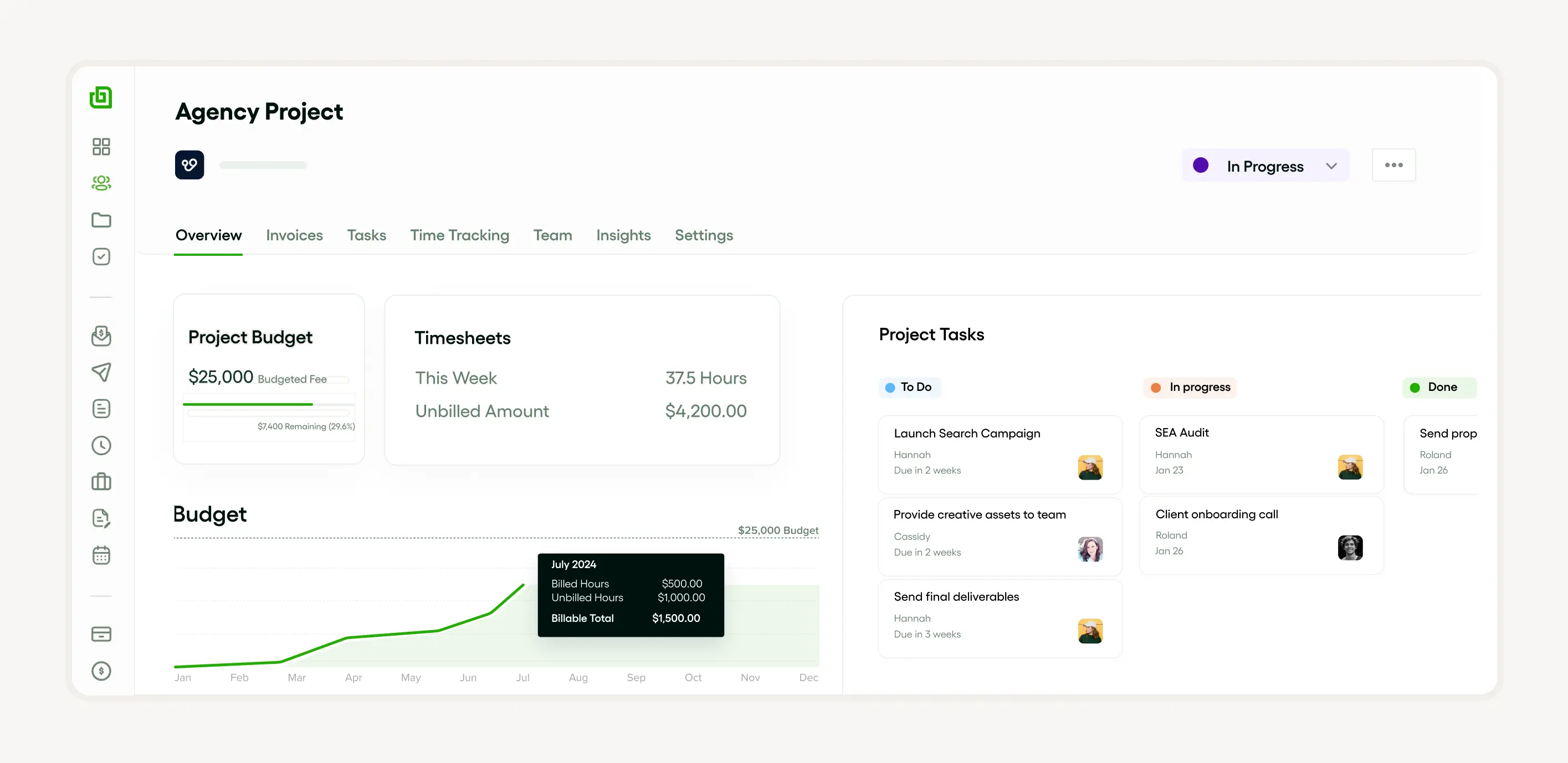
If you're an agency, a freelancer or a small business owner looking for a comprehensive solution to help you run your business efficiently, Bonsai is the perfect all-in-one suite. It offers a wide range of features that don't compromise functionality, making it a perfect alternative to HoneyBook.
With Bonsai, you get easy access to more than 500+ customizable templates for various documents, saving you the hassle of creating documents from scratch. You can use Bonsai to quickly prepare and send proposals, invoices, and contracts, and send them for e-signatures using our online signature maker.
Additionally, Bonsai comes with time tracking, task management and project management features, a scheduling feature, as well as automated expense tracking, accounting and business account! In short, Bonsai is a versatile tool that can help you streamline your business operations and boost your productivity. Bonsai is available in 180 different countries, ideal for agencies, consultants, architects, or freelancers who want to work internationally.
Bonsai has been used and trusted by more than 500,000+ small businesses and agencies globally – go ahead and sign up for a free trial today!
Features
- Client CRM . From prospect to project and contract to payment, you can now manage everything all in one place. Bonsai provides client portals, allowing you to centralize client communication, share documents and collaborate on tasks.
- Project management. Assign tasks to your team, prioritize your week, easily monitor your project's progress and track budgets in real-time.
- Time tracking. Track your time on projects and specific tasks, instantly add them to your invoices and generate time and utilization reports.
- Bonsai Tax. Our product is built for agencies or self-employed workers to track expenses, maximize tax write-offs, and estimate quarterly taxes.
- Automates contracts, proposals, and invoices. Create, send and e-sign documents from legally vetted templates you can trust.
- + 500 Customizable templates
- Simple and comprehensive tools for easy business management
- Intuitive mobile application
- Simple pricing
- Available in 180 different countries
Pricing
- Basic: $9/user/month
- Essentials: $19/user/month
- Premium: $29/user/month
- Elite: $49/user/month
Try Bonsai for free now or book a demo.
#2. NiftyPM

Nifty is a robust platform designed to streamline workflows, enhance team collaboration, boost productivity, and centralize business and client management. With its comprehensive suite of features, Nifty empowers businesses of all sizes to effectively manage projects and nurture client relationships from initial contact to project completion and beyond.
Why Nifty is the Best Fit:
Nifty distinguishes itself with a powerful blend of project management, client relationship management (CRM), and business operations tools, all within a single, unified platform. It simplifies managing tasks, milestones, documents, communication, client interactions, and business finances, offering a more holistic solution than many specialized tools.
Features
- Time Tracking for Client Projects: Monitor billable hours and project time for clients.
- Budgeting & Expenses for Client Projects: Manage project budgets and track expenses.
- Client Communication Tools: Communicate directly with clients within the platform.
- Customizable Branding for Client Interactions: Maintain brand consistency in client-facing materials.
- Roles & Permissions for Client Access: Control client access to information and features.
Pricing
Free Plan: For small teams with basic needs.
Starter Plan: $39/month (billed annually) for up to 10 team members.
Pro Plan: $79/month (billed annually) for up to 20 team members.Business Plan: $124/month (billed annually) for up to 50 team members.
Unlimited Plan: $399/month (billed annually) for unlimited team members and advanced features.
#3. Dubsado
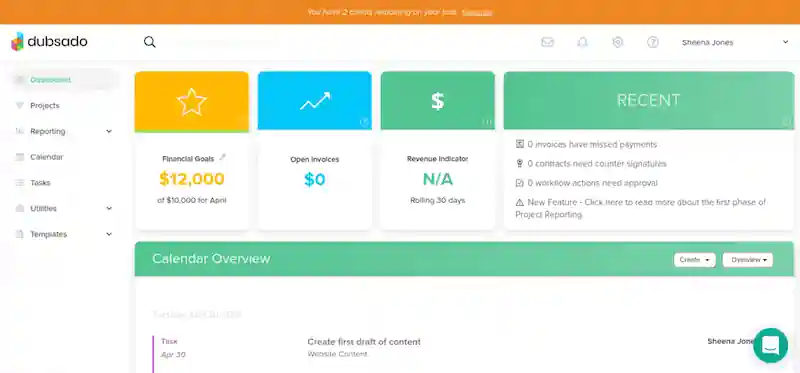
Dubsado is a popular business management and project management solution and a good alternative to HoneyBook. It features a dashboard that reports and shows sales, income, expenses, and net profits over time, making it effective for small businesses and freelancers.
You can book appointments with clients and connect your email to your calendar and payment processor to ensure your system is integrated. The tool offers a wide range of customizable options to add your brand easily.
Dubsado is a robust tool where you can build an interactive client portal that helps in overall client-facing experience, automation, scheduling, and invoicing to make life easier for you and your clients. You can also create payment schedules and send automatic reminders.
Features
- Customizable forms and templates
- Interactive client portal
- Automated admin tasks
- Built-in scheduler, invoicing, and reports
Pricing
- Starter: $20 /month
- Premier: $40/ month
#4. 17hats
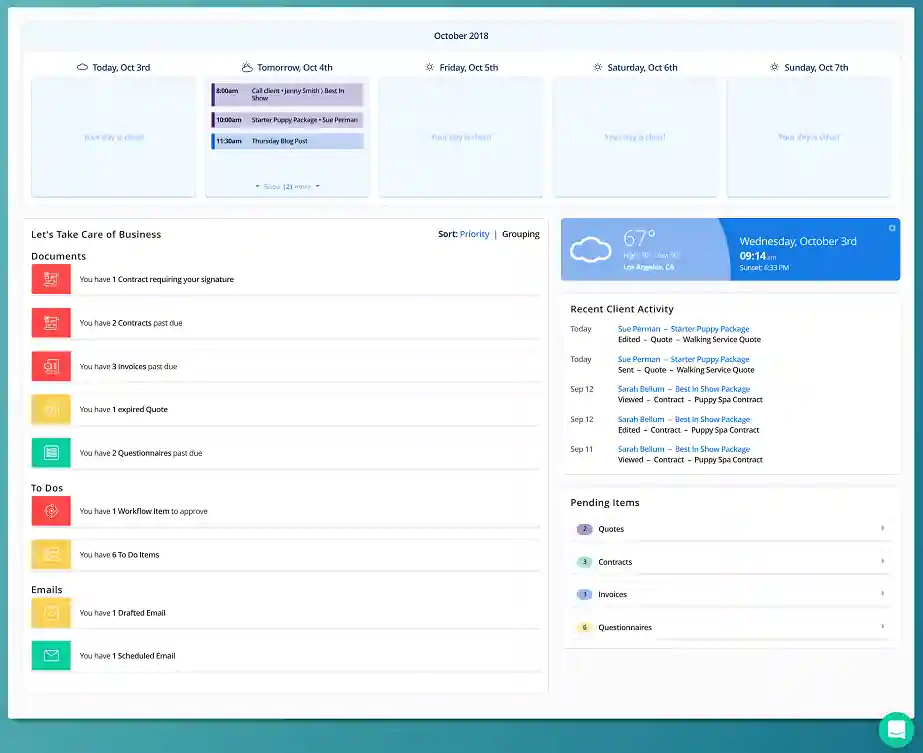
As an entrepreneur, you have to play various roles depending on the situation. The name 17hats perfectly encapsulates this fact. It is a comprehensive business management solution that conveniently combines your calendars, contacts, and invoices in one place, making it effortless to manage your business.
Paperwork is simplified with an online system that streamlines lead tracking, booking coordination, document creation, and project management.
The tools in 17hats are divided into categories, making it easy to track your company's progress with financial details at a glance. You can monitor your results by job, month, or quarter. Additionally, 17hats offers a unique branding customization option that gives your business a professional look. With these features, managing your business, contacts, time, and leads becomes easier, so 17hats is one good alternative to HoneyBook.
Features
- Centralized business operations in one dashboard
- Automated workflow
- Customized branded outlook
- Time and client management
- Email templates
- Online scheduling, invoices, and payments
Pricing
- Essentials package: $15/ month
- Standard package: $30/ month
- Premier package: $60/ month
#5. Insightly
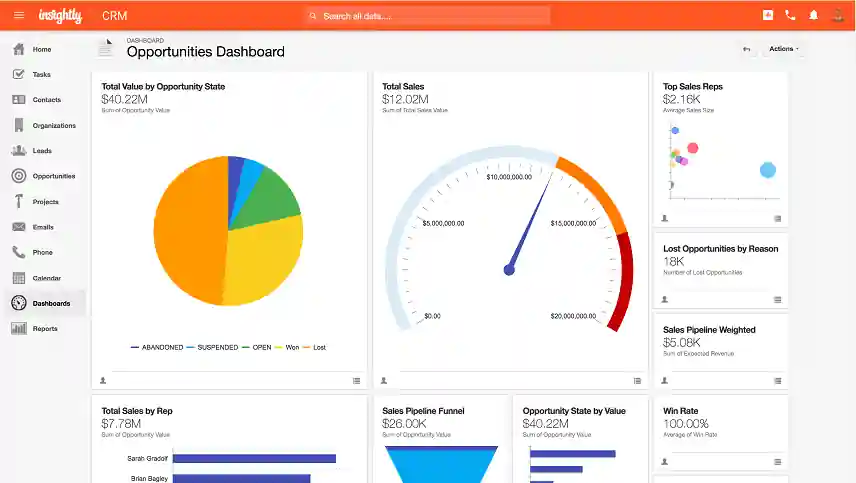
Insightly is a highly rated CRM platform that helps manage clients and build client relationships, and also provides a range of functionality and integration to support your business. It is integrated with marketing, sales, and project management tools in one place, coherently, making it particularly useful for freelancers who have a team.
You can use it to manage a sales team and improve your business processes, by distributing leads to sales reps, sending tracked emails to prospects, and managing sales opportunities. Furthermore, you can also use it for project management and connect it to tools you already use, like Office 365 or Google Apps.
Features
- Full-featured CRM
- Easy to customize
- A/B email testing
- Instant marketing insights
- Email marketing campaign
- Project Management
Pricing (billed annually)
- Plus: $29/ month
- Professional: $49 /month
- Enterprise: $99 /month
#6. Plutio
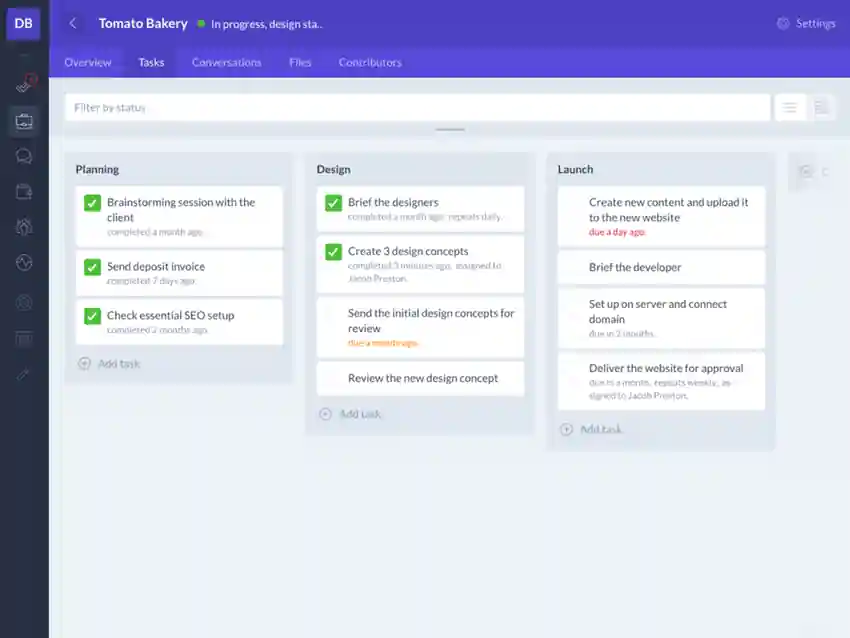
Plutio is another ideal platform for freelancers and is a great HoneyBook alternative. It has multiple integrated features such as project management, tasks, and invoice tracking in one dashboard, which is perfect for those managing small businesses. It also allows you to create proposals and contracts using a drag-and-drop tool that’s easy to use so it makes it easier to manage projects.
Moreover, the powerful customer relationship management tool feature helps you build and track client relationships. It also allows you to track when proposals and contracts are opened and signed, as well as when invoices are opened. Plutio also provides clients with multiple payment options and easy online payment integration, making the transactions easy for both parties.
Features
- Customizable and comprehensive workspace
- Automates workflow
- Comprehensive client portal
- Supports multiple languages
- Integrated tasks, projects, and time management
- Generated invoices and contracts
- Multiple payment options
- Project Management
Pricing
- Solo: $19/ month
- Studio: $39 /month
- Agency: $99 /month
#7. Monday

Monday is another great CRM and management software that can be a better HoneyBook alternative for bigger businesses and teams. This system is also powerful if you work remotely.
Monday supports marketing and sales pipeline by using great features that include lead capturing, lead management, email synchronization, and more. It also has project management tools and allows you to manage a remote team by customizing any workflow to fit your needs. If you’re building an agency and want to collaborate with other freelancers, Monday has the tools you’ll need.
Features
- Kanban board outlook
- Client CRM management
- Performance and task tracking
- Sales and expense tracking
- Third-party integrations
- Management software
Pricing
- Individual plan: Free forever (Maximum 2 users, up to 3 dashboards, and 200 templates)
- Basic: $10 per seat /month
- Standard: $12 per seat /month
- Pro: $20 per seat /month
- Enterprise plan: Pricing upon request (Exclusive features)
Note: The paid plans require a minimum of 3 users.
#8. StudioNinja
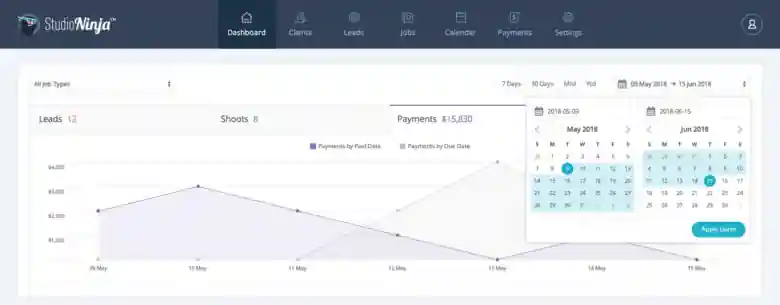
If you’re a freelance photographer, StudioNinja is made specifically to suit your needs. It has a comprehensive and simple user interface making it easier to use, and is praised by photographers and videographers.
itStudioNinja streamlines lead conversion and workflow management with automated email campaigns and revenue tracking for website inquiries.
You can track progress on jobs, manage clients' information, schedule jobs, automatically send contracts and questionnaires to clients, and use them for quotes, contracts, and invoices. You can also set up a payment system and generate reporting to simplify tax time. Considering all the outstanding above-mentioned features, StudioNinja makes the best HoneyBook alternative for photographers.
Features
- Good photography CRM
- automated emails
- Customizable workflow
- User-friendly interface
- Automated invoice reminders
- Online invoicing
- Supports multiple languages
Pricing
- Pro: $24.90/ months
- Master: $36.50/ month
#9. Bloom
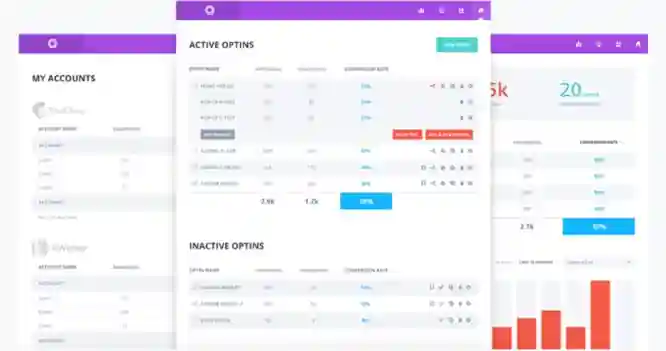
Bloom is another tool considered a top client management system for photographers and creative freelancers. It comprises a product suite that helps creative types handle the administrative tasks that take time away from creative pursuits, making it another best alternative to HoneyBook.
The management software makes it simple to track tasks and projects, as well as helps streamline your customer management process and hence, the overall business processes. The integrated invoicing software makes it simple to send invoices and process payments, and a powerful calendar system makes life easy for your clients.
Sharing your Bloom calendar link helps your clients to align their calendars with yours. You can even embed an event planner link in a contract to make it simple to onboard new clients. Bloom Calendar also allows you to sync with Google and iCal to easily manage your work and personal life.
Features
- Top-rated client portal CRM management for photographers and creative individuals
- Allows sharing curated galleries of client’s photographs
- Automated emails and personalized follow-up messages
- Create website portfolio
- Track and manage leads
- Project management
- Task Management
- Online invoicing
Pricing
- Starter: $17 /month
- Standard: $37 /month
- Full-serve: Custom services (schedule a call and personalize a package as per your needs and requirements)
#10. Tave
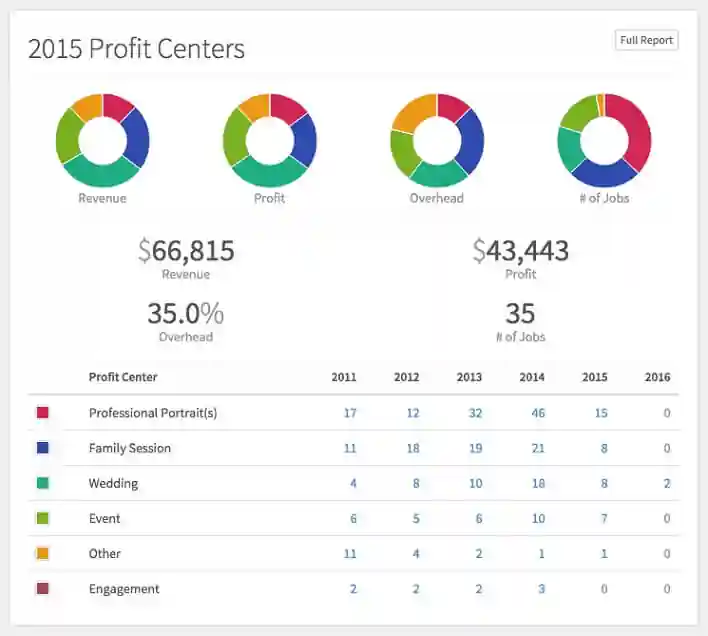
Tave is another management software designed for photographers assisting in client management, workflow automation, and accounting. It is user-friendly and helps with invoice management by automating invoice reminders, and preparing calendars and to-do lists. It also allows you to track client communication with emails, quotes, contracts, and questionnaires.
It offers e-signature for contracts, connects to payment gateways, and provides advanced tax reporting. You can also personalize your client-facing communication by customizing it with your brand.
Features
- Good CRM for photographers
- Lead tracking
- Client Management tools
- Send invoices and contracts with ease
- Workflow automation
- Ability to create and send quotes
- Automatically populates data
Pricing
- Solo: $24.99/ month (2 users and 1 brand)
- Boutique: $34.99/ month (6 users and 4 brands)
- Studio: $49.99 /month ( 10 users- $4.99 /additional user with unlimited brands)
What Should You Look for In a HoneyBook Alternative?
Here are a few things to consider when selecting a HoneyBook alternative:
- A comprehensive and user-friendly interface to make your experience as seamless as possible.
- Flexibility to plan and readjust your project strategies so you can meet multiple use cases.
- Robust client management features to maintain good relationships with your perspectives and clients.
- Easy-to-understand invoicing features and integrated contract tool for receiving payments painlessly.
- Reasonable pricing that is within your budget.
- Reliable customer support that provides you with prompt solutions and steadfast assistance
Why Bonsai is the best HoneyBook Alternative?
Bonsai is an all-in-one platform with a user-friendly interface for freelancers and small business owners. You can manage your entire service-based business with the help of its amazing and comprehensive features.
Bonsai has a whole suite of tools for different use cases; the CRM client portal offers an impeccable experience to your clients. You can generate and send client proposals, manage projects, and set up automated invoices and reminders.
But that’s not all; it also allows you to track business expenses and taxes all in one place. It also has a time tracking and task management feature that lets you accurately bill your clients for the time you put into their projects.
And the best part? You get to enjoy everything at a reasonable price of $25 /month to $79/month, depending on your requirements. So sign up for a free trial to the perfect HoneyBook alternative today!
Ready to try out a new freelance-focused solution?
Do you want to get started with Bonsai, the best HoneyBook alternative? You can sign up for a free trial - no strings attached - and explore the powers of Bonsai to transform how you run your freelance business.






